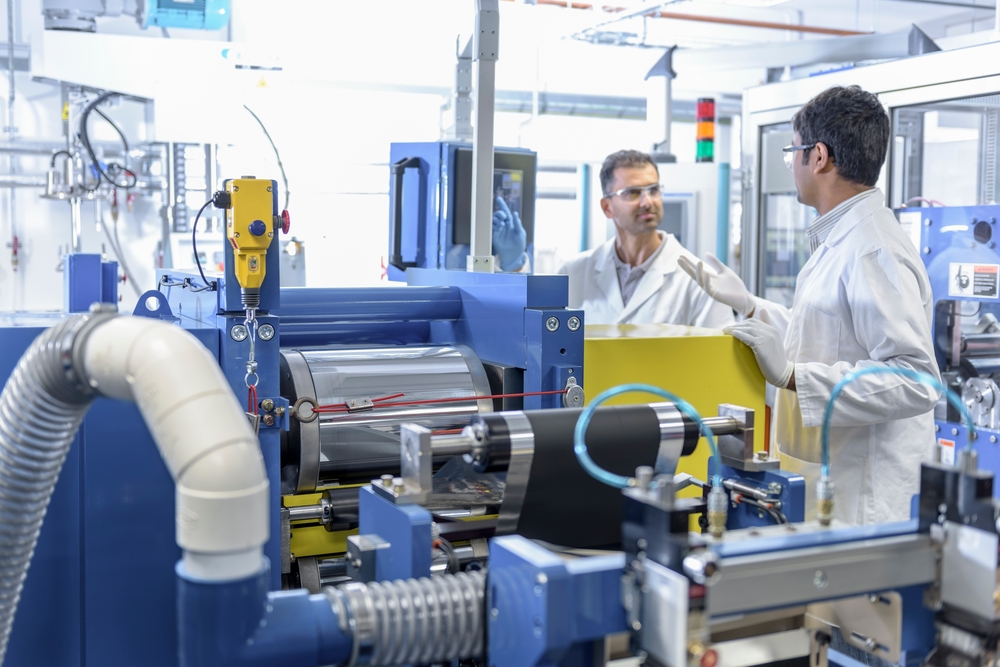In August 2021, President Biden declared, “The future of the auto industry is electric. There’s no turning back.” One region rising to meet the needs of the auto industry as it shifts towards electric is Northern Nevada.
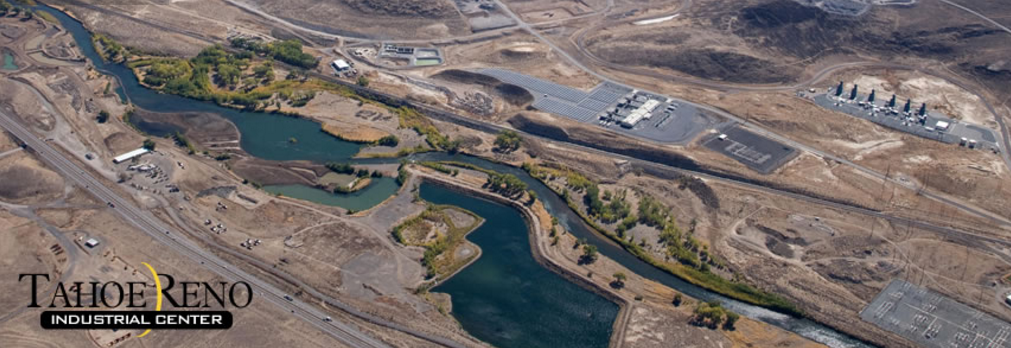
Organizations like the Tahoe-Reno Industrial Center (TRI), the world’s largest industrial park, have laid the function-designed infrastructure necessary to support this emerging battery ecosystem. And the opening of the Tesla Gigafactory by Tesla with Panasonic, has spurred a variety of others to look at Northern Nevada as a hub for battery technology.
Keep reading to learn more about Northern Nevada’s active role in manufacturing lithium-ion batteries, driving the shift from gas-powered to battery-powered vehicles.
Lithium Mining and the Green Revolution
Lithium is the lightest solid element on the Periodic Table of Elements. It fuels energy-powered automobiles and much more. It’s essential to the batteries that run computers, cell phones, and toothbrushes, to name a few. And it’s found in prehistoric volcanic deposits.
Millions of years ago, Northern Nevada witnessed heavy episodes of volcanism, and these ancient events still impact the state today. For example, a prehistoric volcano at Thacker Pass produced a significant lithium deposit, according to Tim Crowley. Crowley is the vice president of government affairs for Lithium Americas and former president of the Nevada Mining Association.
Located in Humboldt County, 50 miles north of Winnemucca, Thacker Pass is the largest known deposit of lithium in the United States. All told, Lithium Americas will extract an estimated 80,000 tons of the element annually from the ground.
What does this mean in terms of electric vehicles? This annual load will power millions of cars.
The mine has also brought countless new jobs to the area, with an estimated timeline of 40 years for full extraction. Thacker Pass contributes a much-needed source of this element to the United States, which has historically produced just one percent of the globe’s lithium.
The White Gold Boom
By 2040, the International Energy Agency has projected growth in global demand of lithium (a.k.a. “white gold”) by over 40 times. To meet this need, mining companies will continue to ramp up production.
Of course, Lithium Americas is just one operation among many in Nevada involved in this effort. All told, there are more than 17,000 prospecting claims for lithium.
As a result, the pursuit of lithium has been dubbed the “white gold” boom. But unlike the California Gold Rush, extracting lithium is anything but a get-rich-quick scheme. Mining and processing lithium takes years, and the current demand far outweighs the supply.
What does this mean in terms of the bigger picture of things? In the years to come, there’s an excellent chance the vehicles you drive will contain batteries with material sourced from Nevada.
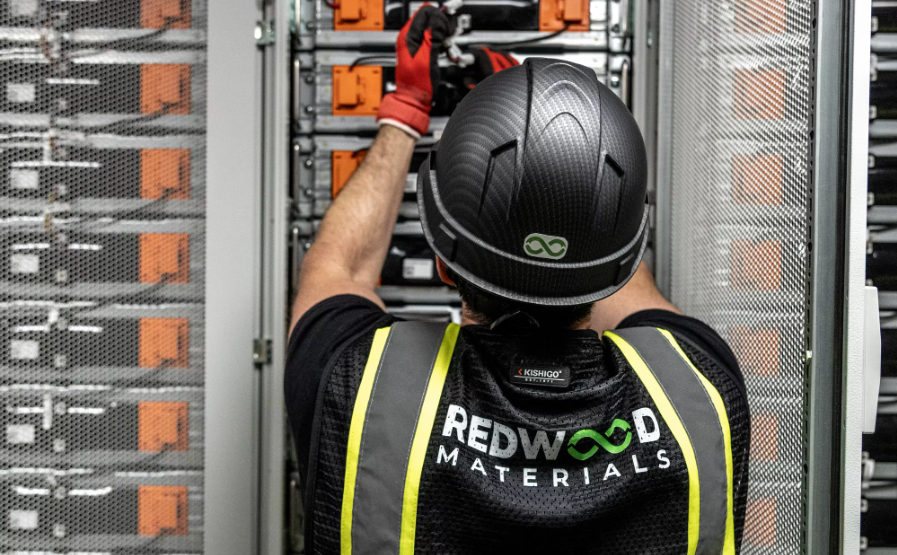
Redwood is transforming the battery supply chain by offering large-scale sources of domestic anode and cathode materials produced from an increasing number of recycled batteries that directly go back to U.S. cell manufacturers. Image Source
Mining and Recycling Go Hand in Hand
Nevada leaders understand the importance of combining extraction and recycling. Mining companies, along with lithium-ion battery recyclers and manufacturers, recognize the potential value and benefit of the two activities to meet worldwide demand.
J.B. Straubel, CEO of Redwoods Materials, explains, “The sheer number of batteries and the sheer number of vehicles is massive. If there is no scaling ahead of time and no solution ready, it could become a big challenge.”
To rise to this “big challenge,” Redwood Materials received a $2 million loan from the Department of Energy in February to build out its battery recycling campus in Nevada. Straubel is not a new face when it comes to battery production.
Before founding Redwood Materials, he acted as cofounder and CTO of Tesla. Today, Tesla operates one of the world’s highest-volume plants for electric motors, energy storage products, and vehicle powertrains and batteries in Northern Nevada.
The Emerging Battery Ecosystem
A growing lithium-ion battery enterprise network continues to bring significant innovation to the Silver State. These thriving enterprises have contributed to economic diversity while adding higher-wage jobs and enriching and advancing the renewable energy industry.
Recycling lithium-ion batteries translates into decreased hazardous waste and greater sustainability. Not only will this ensure that valuable components aren’t wasted, but it will also contribute to increased renewability as the world continues to shift in this direction.
Emerging Lithium-Ion Battery Recycling Technology
As the need for lithium-ion battery recycling has intensified, key players in the industry have made Northern Nevada their home base. They include innovators like Aqua Metals, Redwood Materials, Dragonfly, and LiNiCo.
Each of these companies has heavily invested in researching and developing innovative ways to recycle lithium-ion battery products.
Moreover, they’re pursuing independent patented processes that allow for the use of more significant volumes of reclaimed materials, known as black mass. These companies are paving the way for the re-use of black mass in safer, more cost-effective ways.
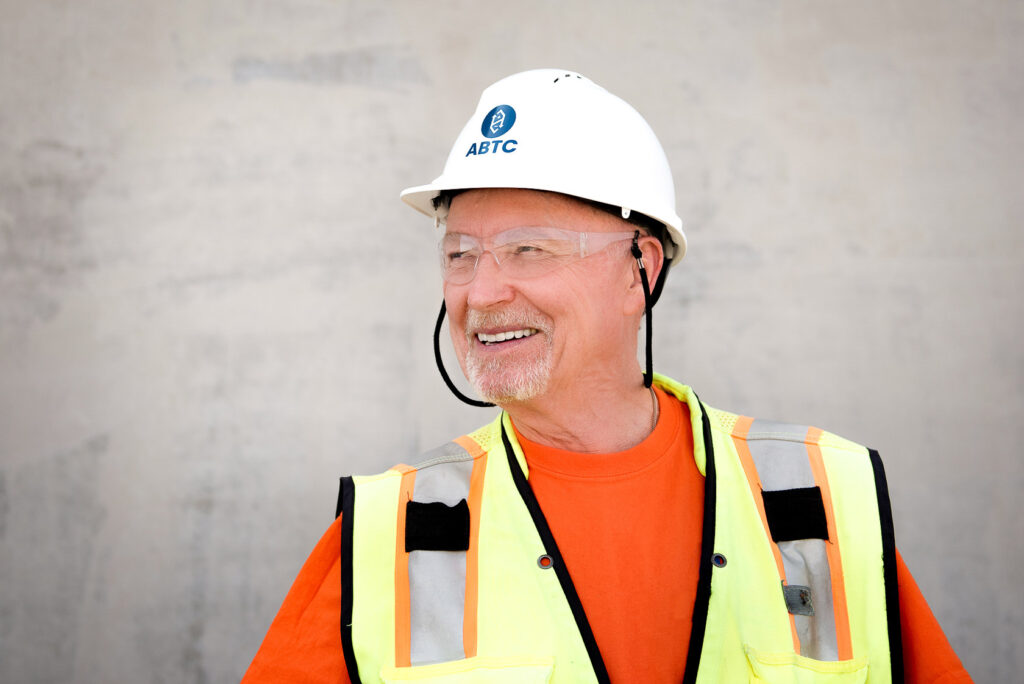
American Battery Technology Company (ABTC) Image Source
Meeting the Demands of Sustainability
By 2030, some predict a lithium shortfall of 250 kilotons. Fortunately, natural lithium deposits in the Silver State provide a critical source of this highly valuable element. Coupled with near-zero-emissions recycling processes pioneered by Nevada-based companies like American Battery Technology Company (ABTC), cutting-edge ways exist to meet this global demand.
Nevada’s lithium-ion battery recycling yields high-value critical battery metals. These metals meet cathode specifications for re-introduction into the battery supply chain. In other words, the products of these processes have the potential to close the battery supply chain loop.
Menka Sethi of ABTC concludes, “Understanding the supply chain risks and implementing regulatory solutions co-created across industry, government, and community will strengthen our domestic supply chains, grow manufacturing jobs at home, and accelerate Nevada and the nation’s ‘battery-powered’ economy.”
Nevada and the Energy Economy of the Future
Because of its relatively accessible lithium and abundant solar, wind, and geothermal activity, Nevada is a vital part of the future green energy economy.
The influx of large technology-based companies to Northern Nevada has brought a high population of green technology-focused employees, but more are needed to keep up with industry growth. Mechanical engineers, chemical engineers, and industrial engineers are all in high demand.
The University of Nevada, Reno, a tier-one educational institution, continues to ensure access to a highly educated and qualified workforce. Sustainable energy companies like Dragonfly Energy recruit heavily from the university. This means most employees within the battery manufacturing industry are now locally based, a significant advantage for those doing business in the state.
Dr. Denis Phares, CEO of Dragonfly Energy, explains, “Lithium produces the most energy-dense electrochemical cells, and therefore provides the greatest alternative to burning fossil fuels for transportation … Our focus is on streamlining the cell production process in order to lower the overall cost of energy storage.”
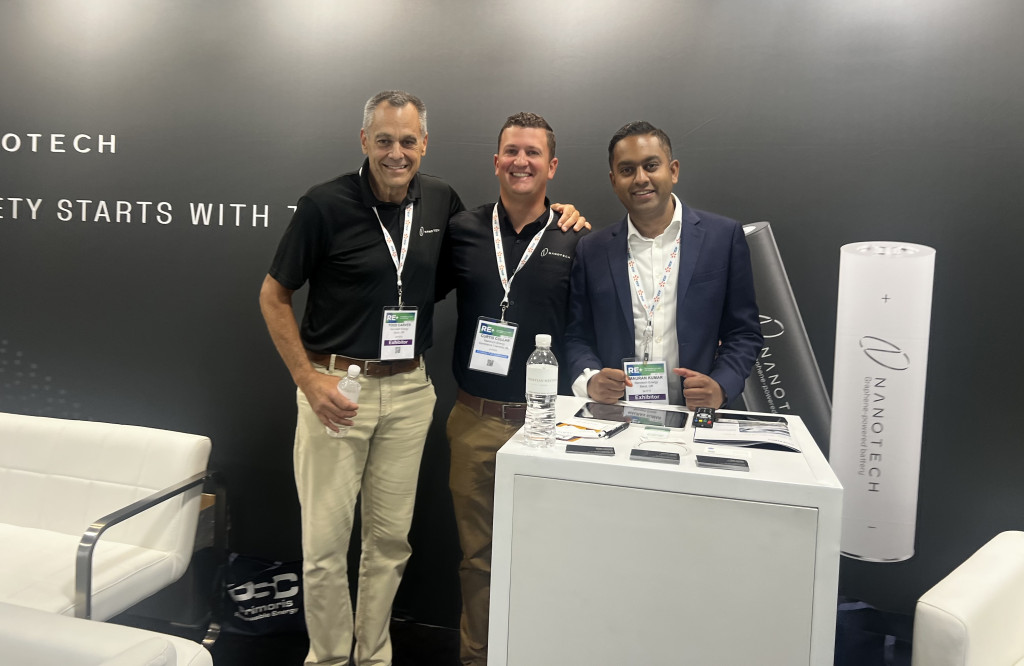
Reps from Nanotech Energy Image Source
Lithium-Ion Batteries: Sustainability and Safety
But what about recent concerns regarding the flammability of lithium-ion batteries? A company recently came onto the scene to deal with these challenges, Nanotech Energy.
Jack Kavanaugh, founder and chairman of the company, explains, “There’s a standardized test used by batteries where you put [it] in a chamber, and basically a nail penetrates and creates an immediate short, and standard batteries will explode and catch fire right away. Ours will not.”
Formerly based in Los Angeles, Nanotech Energy has relocated to Northern Nevada, where it plans to continue to innovate. Not only are the batteries a game changer when it comes to safety, but they can also charge to 80 percent in just 12 minutes!
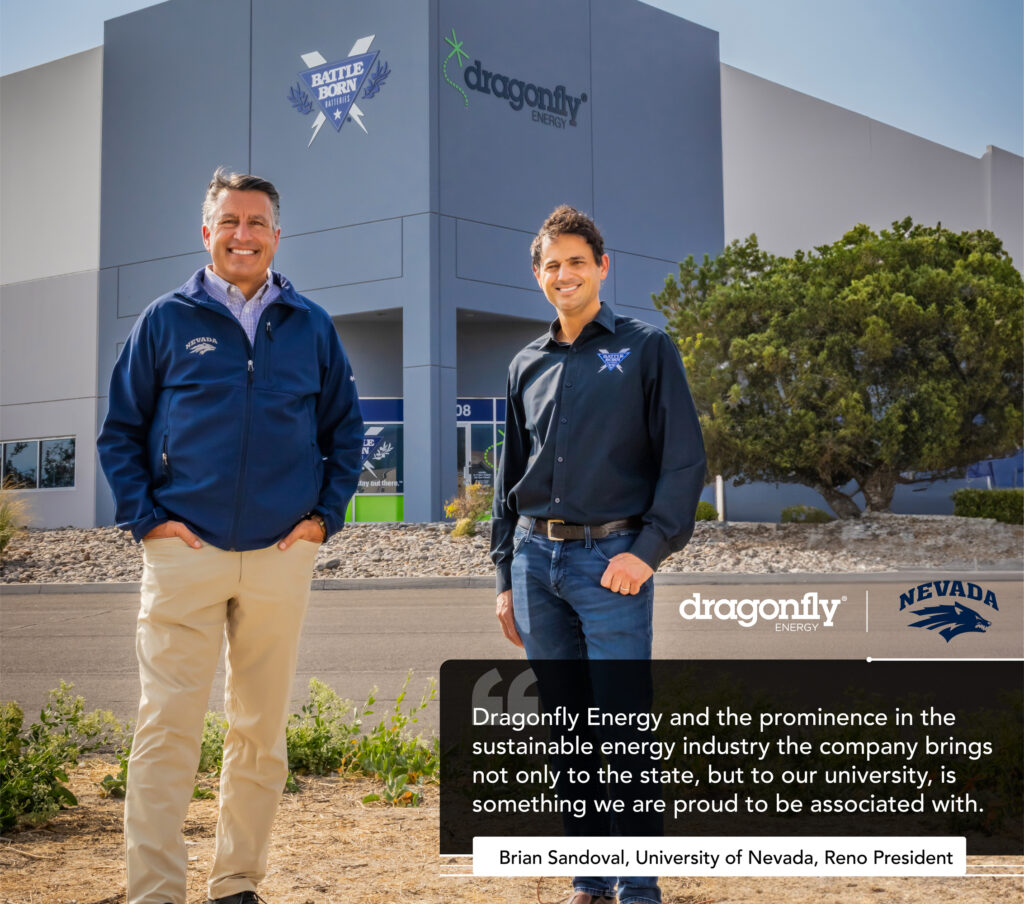
Northern Nevada’s Emerging Battery Ecosystem
As you can see, exciting things are happening in Northern Nevada, especially when it comes to the emerging lithium-ion battery ecosystem. From lithium mining to battery recycling, the “Battle Born” state will continue to play a vital role in meeting future energy needs.
Are you considering a move to Northern Nevada? Or looking for jobs in the automotive manufacturing, tech, or green industries? We’ve got you covered. Browse hiring companies now to start the journey towards your best life (and best career!) in one of the world’s most beautiful locations.
Work Live Play Reno Tahoe is a community-wide initiative powered by EDAWN to recruit skilled workers with all levels of expertise to join the Northern Nevada workforce. Get started by submitting your resume, browse hiring companies, and connect directly with Lindsey, our Community Liaison who will help lead your quest for employment. Working Remotely? Check out our extensive list of Remote Worker Resources. Students can also participate! Visit our new Student Portal to start making connections for your future.
 Engrid Barnett is an award-winning travel writer and digital content marketer based in Western Nevada. Recognized by the Nevada Press Association in 2019, her work has been featured in Nevada Magazine, Northern Nevada Business Weekly, Tahoe South, Rova, American Trails, Ripley’s Believe It Or Not, and more.
Engrid Barnett is an award-winning travel writer and digital content marketer based in Western Nevada. Recognized by the Nevada Press Association in 2019, her work has been featured in Nevada Magazine, Northern Nevada Business Weekly, Tahoe South, Rova, American Trails, Ripley’s Believe It Or Not, and more.
Follow along with us each month for Engrid’s special “Work-Life” review – featured exclusively on WorkLivePlayRenoTahoe.com

